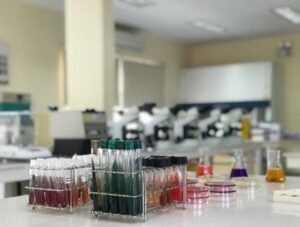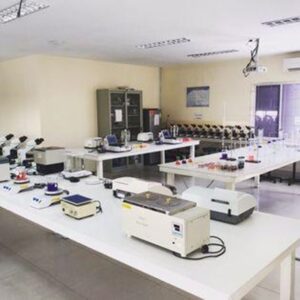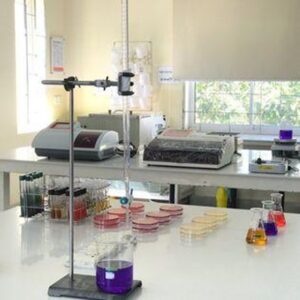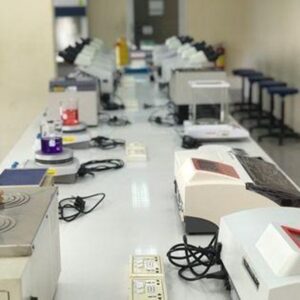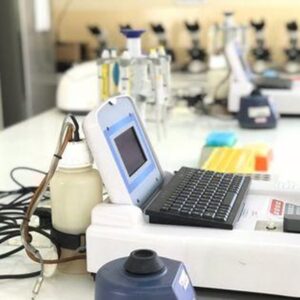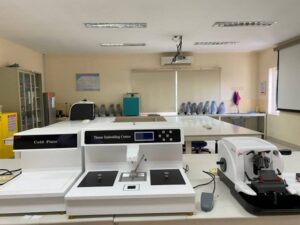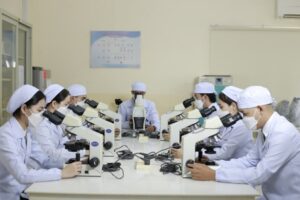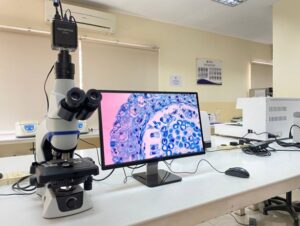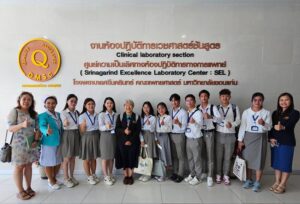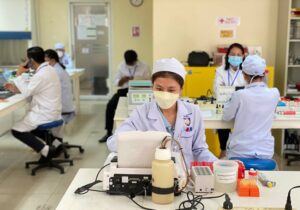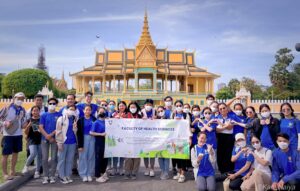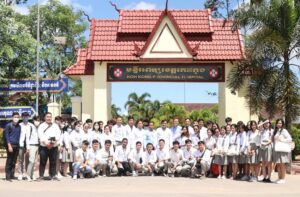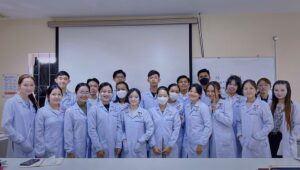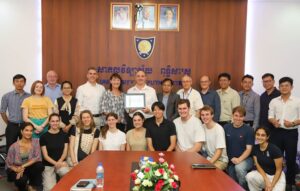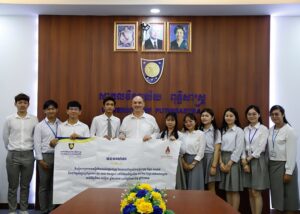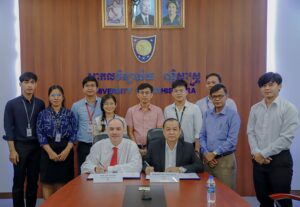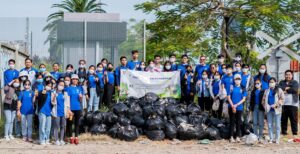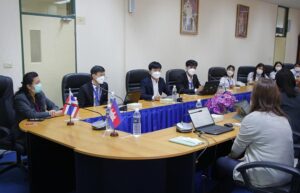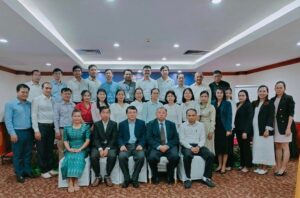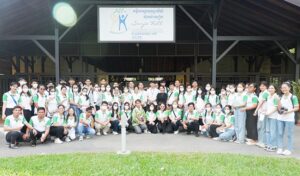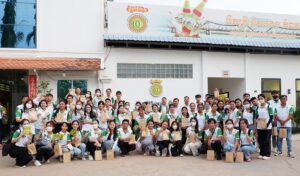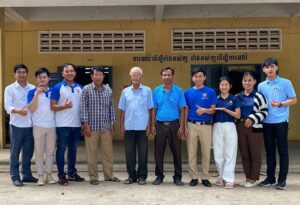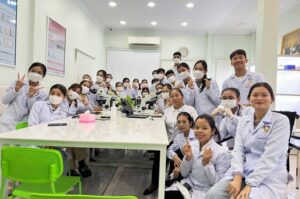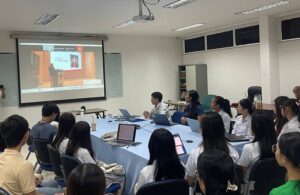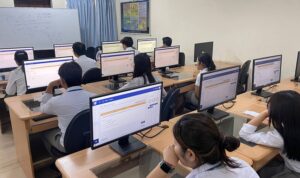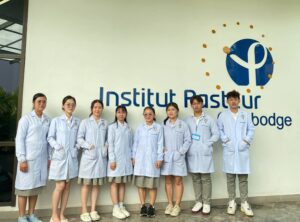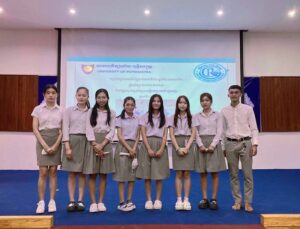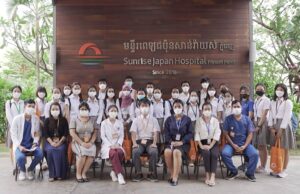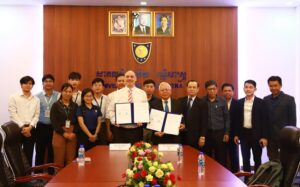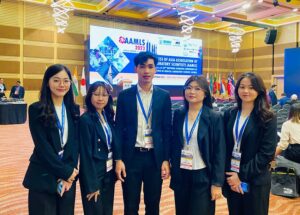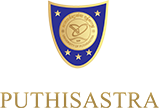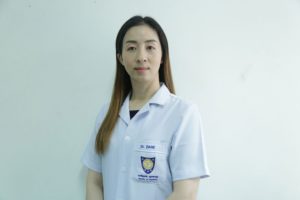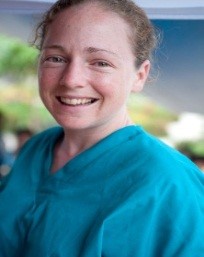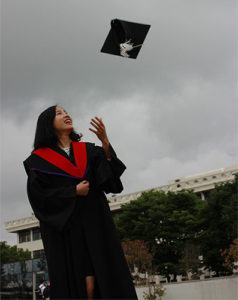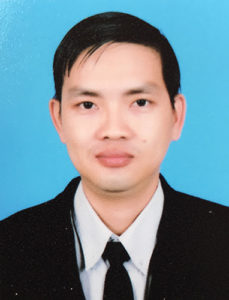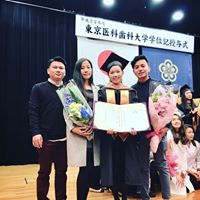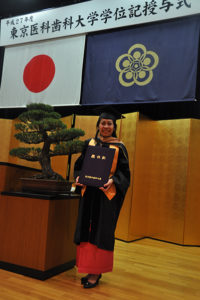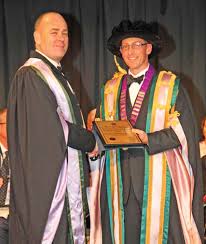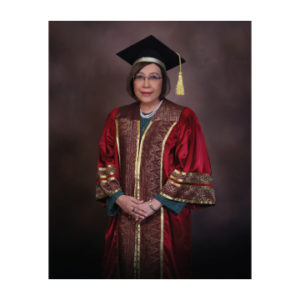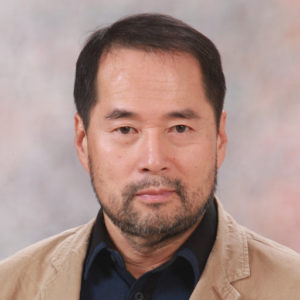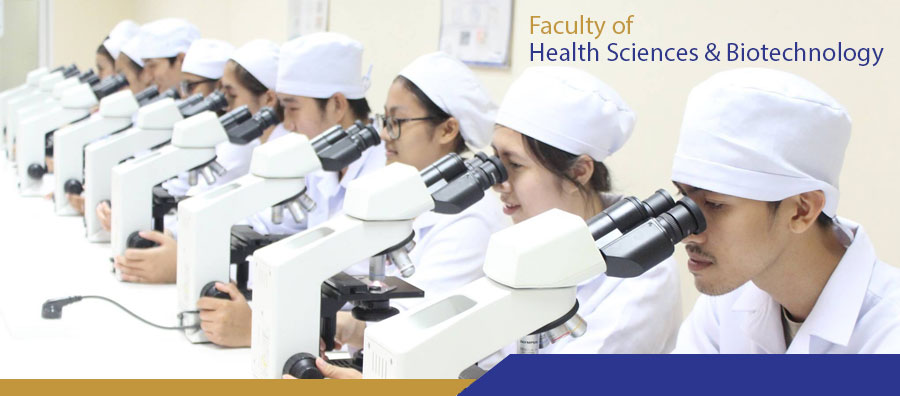
OUR MISSION
The University of Puthisastra focuses on skills for the 21st Century of Health and Technology. Biotechnology is the combination of biology and technology.
Our world is changing rapidly and health is taking the lead. We are witnessing an explosion in health innovation, from MRI to robotic surgery, with genomics and personalized and predictive medicine opening up exciting new frontiers that will revolutionize future healthcare.
Personalized medicine will:
- predict and prevent disease allowing much more effective and efficient targeting/screening etc.
- determine the correct drugs and the correct dose
- offer increasingly personalized treatments
- embrace a more participatory role for patients in their care
In the future, personalized medicine will gather together a mass of biological, clinical, and lifestyle information to present health professionals with a unique picture for each patient and thus tailor make treatment options specific for that patient.
Laboratory technology will be at the heart of genomics and personalized medicine – it’s where new tests get developed, tests get performed and analysis is undertaken.
Join us and let us create the future together.
EDUCATION PROGRAM
| Program and Degree | Study Period | Program Details & Outcomes |
|---|---|---|
| ASSOCIATE DEGREE IN MEDICAL LABORATORY TECHNOLOGY | 3 Years | This program is designed to provide students with a combination of theoretical classes, hands-on technical practices classes under the close supervision from lecturers and laboratory instructors in the UP’s laboratories, and also clinical clerkship and internship in many hospital laboratories and medical laboratory institutes in national level both in public and private sector throughout Cambodia. This program is designed to provide students with a combination of theoretical classes, hands-on technical practices classes under the close supervision from lecturers and laboratory instructors in the UP’s laboratories, and also clinical clerkship and internship in many hospital laboratories and medical laboratory institutes in national level both in public and private sector throughout Cambodia. To strengthen students’ technical skills and knowledge, UP has partnerships with many national and international medical laboratories, hospital laboratories, research laboratories and research institutes, and universities where students can learn and understand based on real practice in a real laboratory. The International Elective Exchange program with many well known universities overseas is an important part of this program aimed at broadening students’ intellectual skills and knowledge to the international activities and study curriculum. To see the programme detailsclick here
|
| BRIDGING BACHELOR IN MEDICAL LABORATORY TECHNOLOGY | 2 Years | This is a part-time bridging program designed to offer flexibility of study time for Medical Laboratory Technology professionals for additional two years to get them a bachelor degree. This program offers students with more advanced courses in Medical Laboratory diagnostics tests in performance and analysis, enabling students to up-skill their professional degree and career advancement. Courses within the program will cover topics related to sciences, research, leadership, and management to enhance student’s professional skills, knowledge, and aptitude in the field of Medical Laboratory Technology. Students will be able to think more critically and could be given responsibility to manage the medical laboratories and deal with technical problems. Graduates from this bridging bachelor degree program will be able to pursue higher degrees in Health Science and Non Health related disciplines. To see the programme details click here
|
Faculty Team Members

Mr. SAY Sinith, MLT, MHA
Medical Laboratory Programs Manager
Tel: (+855) 16 446 144
Email:ssinith@puthisastra.edu.kh
FACULTY RELATED
- International Relationship
- Human Resource
- Research
- Facilities
- Achievements
- Schedule for Classes
- Admission Criteria
- Graduation Criteria
- Future Career Pathway
- Gallery
Medical Laboratory Technology programs in the Faculty of Health Sciences and Biotechnology assists students to do clerkship and internships and preparing them for a successful career in their field. Start from year 2 on, the faculty support the students by providing the opportunity to do clerkship and internship with hospitals and partnership companies to gain more experiences and knowledge to be ready for the real careers’ development paths. In addition, UP has strong collaboration with international universities where students are exposed for study exchange such as Thailand, Vietnam, Malaysia, American, Australia, Korea, Japan..etc. Click Here. Furthermore, UP’s Foundation Year programmes have been certified by IFG, allowing students to apply for UK, Australian, and other international universities’ programmes when they complete Foundation Year at UP. For more information about the opportunities to use UP’s Foundation Year programme to launch into an international degree.
The Faculty of Health Sciences and Biotechnology is aiming to provide the best human capital with the best skills performance and knowledge to the society.
Faculty have members with high qualification who graduated from well-known universities in Cambodia and form international universities with related disciplines and have expertise in their areas and have long years of experiences in their professionalism. All the members are very energetic and have very high commitment to provide the best quality delivery to their students. While dedicating the best quality to students, faculty members also actively focus on upgrading and advancing their professional skills and knowledge by participating in many national and international trainings, workshops, seminars, or congresses offline and online in local and abroad.
Faculty also hire part-time lecturers who have high qualification and long years’ experience in teaching and lab technical instruction so to bring the real critical case scenarios to students to develop their critical thinking and problem-solving skills.
Last but not least, all faculty members have been involved in many researches, surveys and surveillance and have published numbers of researches and publications in many local and international journal.
As Cambodia is becoming more technologically advanced and research focused there is an increased need for professionals with a practical and solid scientific background who are able to provide research support in a variety of fields including chemical, pharmaceutical, food industry, cosmetics, environmental biology, agriculture, forensics, bioscience, microbiology, tissue culture sustainability policy, etc. By including the STI roadmap aims into the curriculum, Cambodian universities can offer exciting and modern degrees that will provide Cambodian graduates with a whole new range of study and employment opportunities in science fields both in Cambodia and internationally, whilst supporting the country to meet their STI Roadmap goals and creating the science and technology leaders of tomorrow.
The UP faculty of Health Sciences and Biotechnology has a wide range of research interests, focusing primarily on the following areas:
- Biotechnology
- Chemistry (Analytical, organic and inorganic chemistry)
- Food (Food processing, food testing and analysis)
- Environmental (Soil, air and wastewater)
- Microbiology
- Molecular biology
- Infection diseases
- Tissue culture (Plant and animal)
- Agriculture
For more information regarding to Faculty of Health Sciences and Biotechnology research please Click Here
The Faculty of Health Sciences and Biotechnology is equipped with high quality machines and equipment with modern technology helping in practical instruction in the laboratory and diagnostic testing. Faculty have enough equipment, supplies and material to support all the practical instruction classes with enough rooms for practice. Moreover, faculty continually invests in upgrading its infrastructure to ensure that students have access to diagnostic tools and resources preparing them to meet the high demand of professions.
The Faculty of Health Sciences and Biotechnology has achieved notable success in career pathway after the students graduate and research. After graduated, the most students get the excellence job with their knowledge and high position. In addition, the number of research publication in the faculty is increase year by year. Furthermore, the faculty has successfully fostered an environment that encourages students to study, to do clerkship and internship, and joining the community project. The faculty also provide students opportunities to join conferences and any competitions and innovation challenges on both national and international stage. The strong collaboration between the faculty, oversea partner-universities and industry partners has resulted in practical applications of excellence academic, research innovation and future career.
Medical Laboratory Technology programs in the Faculty of Health Sciences and Biotechnology will follow the semester system which consists of 2 semesters per academic year.
Associate Degree in Medical Laboratory Technology- Year 1,2 and 3: Monday to Saturday (7:00-5:30)
- The students will have one clerkship per semester in hospital laboratories from year 2 till year 3 and have a 3-month internship after classes have finished in semester 2 of year 3.
- Year 1 and 2: Friday to Sunday (7:00-5:30), either on campus or online
- The students will have one Clerkship/internship from year 1 to year 2 and it will be held from Monday to Friday.
Any student who graduated from high school can apply to study for “Associate Degree in Medical Laboratory Technology” at the Faculty of Health Sciences and Biotechnology. Selection is through the national entrance examination and an entrance examination prepared by UP for Medical Laboratory Technology respectively.
For “Bridging Bachelor Degree in Medical Laboratory Technology” students must have successfully graduated from Associate Degree in Medical Laboratory Technology. Selection is through reviewing all required documents in a meeting with the panel decision from the Ministry of Health and University of Puthisastra.
To complete the program students must pass all the courses required by the national curriculum, and pass University’s exit examination. Additionally, for the bachelor degree students, they will have to publish a thesis book as the partial fulfillment of the requirements to complete this bachelor degree program.
When all above requirements are met, both degree students in Medical Laboratory Technology programs will be eligible to sit the national exit exam.
After graduation with Associate and Bridging Bachelor Degree in Medical Laboratory Technology programs, students can work and advance their career in many fields such as:
| DEGREES IN MEDICAL LABORATORY TECHNOLOGY PROGRAMS |
|
Program Outline for Bachelor of Science Research
| Year 1 Foundation Year | Semester 1 | Credits | Semester 2 | Credits |
|---|---|---|---|---|
| Academic Skills Development | 2 | Introduction to Research Methodology | 2 | |
| Computer Applications | 2 | English Composition: Informative writing | 3 | |
| Core English I | 3 | Anatomy | 3 | |
| English Composition: Fundamentals of Writing | 3 | Embryology | 2 | |
| Khmer History and Culture | 2 | Core English II | 3 | |
| English Intensive I* | 1 | Mathematics** | 2 | |
| Biology | 2 | First Aid | 2 | |
| Biochemistry | 2 | English Intensive II* | 1 | |
| Fundamental chemistry | 3 | English Medical Terminology | 3 | |
| Total Credits per Semester: | 20 | 21 |
| Year 2 | Semester 1 | Credits | Semester 2 | Credits |
|---|---|---|---|---|
| English III | 3 | English IV | 3 | |
| Laboratory Fundamentals | 3 | Biological Systems | 3 | |
| Research Techniques in Chemistry | 3 | Math for Natural Scientists/ Data Collection & Analysis | 6 | |
| Workplace Practices and OHS | 6 | General Microbiology | 3 | |
| Work Integrated Learning (WIL) (2nd year) | 2 | |||
| Total Credits per Semester: | 15 | 17 |
| Year 3 | Semester 1 | Credits | Semester 2 | Credits | |||||
| Specified Sub-units | Forensics | Bioscience | Chemistry | Food Quality | Environment and Sustainability | ||||
| English V | ✔ | ✔ | ✔ | ✔ | ✔ | 3 | English VI | 3 | |
| Cell and Molecular Genetics | ✔ | ✔ | ✔ | ✔ | 3 | ||||
| Laboratory testing | ✔ | ✔ | 2 | ||||||
| Complex Instrumentation | ✔ | ✔ | ✔ | ✔ | ✔ | 1.5 | Method Development and Project Management | 6 | |
| Analytical Chemistry | ✔ | ✔ | ✔ | ✔ | 1.5 | ||||
| Tissue Culture | ✔ | 3 | |||||||
| Using DNA | ✔ | ✔ | ✔ | ✔ | 1.5 | Lab Quality and Registration | 3 | ||
| Biotechnology | ✔ | ✔ | ✔ | ✔ | ✔ | 1.5 | |||
| Food analysis | ✔ | ✔ | ✔ | ✔ | 1.5 | ||||
| Environmental Surveys | ✔ | 1.5 | Work Integrated Learning (WIL) 3rd Year | 3 | |||||
| Environmental Lab Technique | ✔ | ✔ | ✔ | 1.5 | |||||
| Sustainability Policy | ✔ | 3 | |||||||
| Total Credits per Semester: | 15.5 | 15 | 15.5 | 15 | 15 | 15 | |||
| Year 4 | Semester 1 | Credits | Semester 2 | Credits |
|---|---|---|---|---|
| English VII | 3 | English VIII | 3 | |
| Advanced Scientific Techniques | 3 | Research Project (Thesis) | 6 | |
| Scientific Writing | 6 | Work Integrated (WIL) 4th Year | 5 | |
| Research Protocol & Ethics | 6 | |||
| Research Proposal | 2 | |||
| Total Credits per Semester: | 20 | 14 |
Program Outline for Associate Degree in Medical Laboratory Technology
| Year 1 | Semester 1 | Credits | Semester 2 | Credits |
|---|---|---|---|---|
| Sociology | 1 | Life Science | 2 | |
| Chemistry | 2 | Biology | 2 | |
| Chemistry (TP) | 1 | Basic Computer | 1 | |
| Physics | 2 | Basic Computer (TP) | 1 | |
| Physics (TP) | 1 | Anatomy & Physiology1 | 2 | |
| Philosophy and Khmer Culture | 1 | Anatomy & Physiology2 | 2 | |
| Communication Skills | 1 | Anatomy & Physiology3 | 2 | |
| Medical Terminology (English) | 3 | Microbiology (Bacteriology) | 1 | |
| Law and Ethics in Medical Laboratory Technology Practice | 1 | Microbiology (Virology) | 2 | |
| Laboratory Materials and equipment | 2 | Microbiology (Parasitology) | 1 | |
| Laboratory Materials and equipment (TP) | 1 | Microbiology (Mycology) | 1 | |
| General English 1 | 2 | Specimen and Laboratory Safety | 1 | |
| Specimen and Laboratory Safety (TP) | 2 | |||
| General English 2 | 2 | |||
| Total Credits per Semester: | 18 | 22 |
| Year 2 | Semester 1 | Credits | Semester 2 | Credits |
|---|---|---|---|---|
| Immunology I | 3 | Blood Transfusion Science I | 2 | |
| Biochemistry I | 2 | Blood Transfusion Science I (TP) | 1 | |
| Biochemistry I (TP) | 1 | Clinical Practice Blood Transfusion Science (Clerkship) | 1 | |
| Hematology and Hemostasis I | 2 | Laboratory Techniques in Hematology and Hemostasis I | 1 | |
| Hematology and Hemostasis I (TP) | 1 | Laboratory Techniques in Hematology and Hemostasis I (TP) | 2 | |
| Lab Techniques in Microbiology I (Parasitology) | 1 | Lab Techniques in Microbiology I (Bacteriology) | 2 | |
| Lab Techniques in Microbiology I (Parasitology) (TP) | 1 | Lab Techniques in Microbiology I (Bacteriology) (TP) | 1 | |
| Statistic Science | 2 | Lab Techniques in Microbiology II (Parasitology) | 1 | |
| Laboratory Techniques in Urine and Body Fluid Analysis | 1 | Lab Techniques in Microbiology II (Parasitology) (TP) | 1 | |
| Laboratory Techniques in Urine and Body Fluid Analysis (TP) | 1 | Laboratory Techniques Biochemistry II | 2 | |
| Lab Techniques in Microbiology II (Mycology) (Clerkship) | 1 | Laboratory Techniques Biochemistry II (TP) | 1 | |
| Clinical Practice Specimen and Laboratory Safety (Clerkship) | 1 | Laboratory Techniques in Immunology I | 1 | |
| General English 3 | 2 | Laboratory Techniques in Immunology I (TP) | 2 | |
| General English 4 | 2 | |||
| Total Credits per Semester: | 19 | 20 |
| Year 3 | Semester 1 | Credits | Semester 2 | Credits |
|---|---|---|---|---|
| Blood Transfusion Science II | 2 | Immunological and Serological Techniques | 1 | |
| Blood Transfusion Science II (TP) | 2 | Immunological and Serological Techniques (TP) | 2 | |
| Pharmacology | 2 | Hematology and Hemostasis II | 2 | |
| Lab Techniques in Microbiology II (Bacteriology) | 2 | Hematology and Hemostasis II (TP) | 1 | |
| Lab Techniques in Microbiology II (Bacteriology) (TP) | 2 | Hematology and Hemostasis I and II (Clerkship) | 1 | |
| Lab Techniques in Microbiology I (Bacteriology) (Clerkship) | 1 | Parasitology | 1 | |
| Laboratory Management Generality | 1 | Parasitology (TP) | 2 | |
| Laboratory Management II | 2 | Laboratory Techniques in Biochemistry II | 1 | |
| General English 5 | 2 | Laboratory Techniques in Biochemistry II (TP) | 1 | |
| Biochemistry I and II (Clerkship) | 1 | |||
| Bacteriology I and II (Clerkship) | 1 | |||
| Parasitology (Clerkship) | 1 | |||
| Immunology-serology (Clerkship) | 1 | |||
| Advanced Laboratory Management (Clerkship) | 1 | |||
| Internship | 10 | |||
| Total Credits per Semester: | 16 | 14 |
Program Outline for Bridging Bachelor Degree in Medical Laboratory Technology
| Year 1 | Semester 1 | Credits | Semester 2 | Credits |
|---|---|---|---|---|
| Sample collection and management | 1 | Blood Transfusion | 1 | |
| Bacteriology lab Techniques (TP) | 1 | Laboratory Information System (LIS) | 1 | |
| Bacteriology lab Techniques (Clerkship) | 1 | Basic concepts of research in Medical Laboratory Sciences | 3 | |
| Biochemistry | 1 | Cellular and Molecular Biology | 2 | |
| Biochemistry (TP) | 1 | System Pathology | 2 | |
| Biostatistics | 2 | Biosafety and Biorisk Management | 1 | |
| Fundamental epidemiology for medical laboratory | 1 | Toxicology for Medical Technology | 1 | |
| Hematology and hemostasis II (Clinic) | 1 | Leadership and Management | 2 | |
| Hematology and hemostasis II (Clinic) TP | 1 | Special English for Medical Laboratory II | 2 | |
| Immunology application in Lab | 1 | |||
| Immuno-pathology | 1 | |||
| General virology and application in clinic | 1 | |||
| Special English for Medical Laboratory I | 2 | |||
| Total Credits per Semester: | 15 | 15 |
| Year 2 | Semester 1 | Credits | Semester 2 | Credits |
|---|---|---|---|---|
| Communication skill | 2 | Laboratory Quality Management System (Clerkship) | 1 | |
| Communication skill (Clerkship) | 1 | Seminar in Medical Technology (Clerkship) | 1 | |
| Cytopathology | 1 | Memoir (Degree Thesis) | 2 | |
| Cytopathology TP | 1 | |||
| Laboratory Quality Management System | 2 | |||
| Elementary Forensic Sciences | 1 | |||
| Special English for Medical Laboratory III | 2 | |||
| Internship | 10 | |||
| Total Credits per Semester: | 20 | 4 |





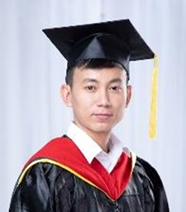 SAY Sinith
SAY Sinith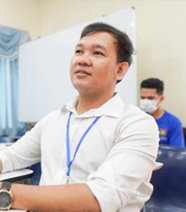 Yem Vuthy
Yem Vuthy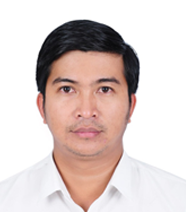 Hem
Channvatanak
Hem
Channvatanak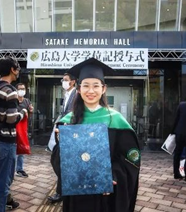 Heng Sreyly
Heng Sreyly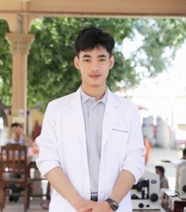 Toem Lanyra
Toem Lanyra